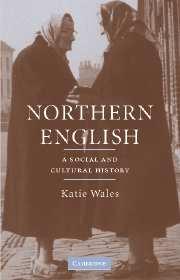Book contents
- Frontmatter
- Contents
- List of illustrations
- Preface
- List of abbreviations and symbols
- 1 ‘The North–South divide’
- 2 The origins of Northern English
- 3 Northern English and the rise of ‘Standard English’
- 4 Northern English after the Industrial Revolution (1750–1950)
- 5 Northern English present and future
- References
- Index of Northern English features
- General index
3 - Northern English and the rise of ‘Standard English’
Published online by Cambridge University Press: 22 September 2009
- Frontmatter
- Contents
- List of illustrations
- Preface
- List of abbreviations and symbols
- 1 ‘The North–South divide’
- 2 The origins of Northern English
- 3 Northern English and the rise of ‘Standard English’
- 4 Northern English after the Industrial Revolution (1750–1950)
- 5 Northern English present and future
- References
- Index of Northern English features
- General index
Summary
A North–South divide? Images of Northern English to 1700
In this chapter I wish to probe and tease out aspects of that particular semiotic opposition, deeply rooted, which ultimately marks the story of Northern English as being quite distinctive from that of other regional dialects, although all of them have been lumped together and branded by the ideological labelling of ‘non-standard’. The issue of an opposition between ‘standard’ and ‘non-standard’, especially in speech, will be explored in particular in 3.3 on eighteenth-century developments; in this section I explore the older opposition, that between the North and ‘the South’: inevitably, as London's power and prestige increases, compounded by an opposition between the North and the capital city. As stated in chapter 1, the North tends to exist in popular perception in relation to an ‘Other’, and to be defined by something outside it. And in the large majority of instances, this popular perception is negative, although, as we shall see in this chapter, a more positive image has sometimes emerged at different historical moments.
One important caveat for the earliest periods of the North's history, noted also in chapter 2, is the paucity of data, or of evidence about linguistic attitudes. We might not want to agree with Skeat's rather startling dismissal (1911: 24) of knowledge of the Late OE and ME periods for this region as ‘with a few significant exceptions … a total blank’, but we can sympathise.
- Type
- Chapter
- Information
- Northern EnglishA Social and Cultural History, pp. 64 - 114Publisher: Cambridge University PressPrint publication year: 2006



